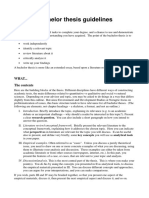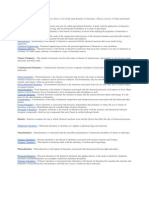Monash Science Chemistry Brochure 2015
Monash Science Chemistry Brochure 2015
Uploaded by
MonashscienceCopyright:
Available Formats
Monash Science Chemistry Brochure 2015
Monash Science Chemistry Brochure 2015
Uploaded by
MonashscienceOriginal Description:
Copyright
Available Formats
Share this document
Did you find this document useful?
Is this content inappropriate?
Copyright:
Available Formats
Monash Science Chemistry Brochure 2015
Monash Science Chemistry Brochure 2015
Uploaded by
MonashscienceCopyright:
Available Formats
monash.
edu/chemistry
Science
Chemistry
The foundation for
all other sciences.
You can study a Chemistry major in the following courses:
Bachelor of Science
Bachelor of Science Advanced Research (Honours)
Bachelor of Science Advanced Global Challenges (Honours)
A major in Chemistry can also be taken as part of a double
degree. For further details and information on these options
please see our Science Undergraduate Course Guide or
visit monash.edu/science/future/courses/
Honours studies
Following their first degree,
students can apply to do
honours. The honours
program involves the
completion of a research
project and coursework
options that cover a broad
range of topics selected by
the student in conjunction
with the coordinator.
Postgraduate studies
After honours, students can apply to undertake MSc and PhD
studies. These degrees involve coursework options and a
research project or thesis.
Courses
Dr Chris Thompson
Lecturer in Chemistry at Monash
Chris Thompson is an academic with a special focus on
education. Not every university employs specialist educators
and in an unusual move, there is a handful of these rare
specialists in the Monash Faculty of Science. Chriss research
implements innovative ways to teach chemistry.
I want to change the way we educate chemistry students
to help them become professional scientists who are trained to
think independently; to ask clever questions and devise solutions.
Students entering the chemistry course in 2015 will enter
a new world. A 9500m2 multi-level building known as
Green Chemical Futures is nearly finished on the Clayton
campus. The top two floors will be an incubator for more
than 100 chemists and engineers doing both basic science
and industry-driven research. The lower levels will house
purpose-built labs and learning spaces.
The new labs will accommodate 1200 first year students.
Theyll be in groups of 16 at long benches, each with a screen,
gleaming glassware and new instruments. Everything will
be fresh and new. Were going to have fun. Imagine an
experiment where we might give a team of students a
vial containing an unknown white powder. Theyll have
two weeks to come up with a strategy on how they plan
to identify the powder. Then, to confirm their hypothesis,
theyll be asked to do some chemistry to actually make it.
Theres real energy and
excitement in Monash
Chemistry. Students are here
because they want to learn,
to better themselves. One of
the things I love about being in
the field of Chemistry research
is I can go into a lab and know
that I am the first human being
on Earth to try an experiment.
Theres the possibility Ill
uncover something amazing
and that Im closer to
a major discovery.
Dr Rico Tabor
Lecturer in Chemistry at Monash
For more information, visit monash.edu/science/future
Studying
Chemistry at
Monash will
equip you
with skills you
can use in
any career.
Our journey to become leaders in the global shift
towards green and sustainable chemistry starts
with us, which is why were building a Green
Chemical Futures hub right here on campus.
Green Chemical Futures unifies teaching, research,
and industry in one location.
The building will be a fresh and engaging academic
environment, where students can collaborate with
their peers, academics, and industry professionals.
We are creating a vibrant home where students
can learn, network and socialise.
GCF is the heart of forward-thinking
in chemical science, with each level
inviting students and researchers
to explore possibilities and stretch
their mind, marrying learning with
innovation in the same building.
The lower levels of the building
will house innovative teaching and
collaborative learning spaces,
moving away from traditional lecture
halls in favour of inviting spaces
that encourage active learning and
creative problem-solving in smaller
groups. State-of-the-art research
laboratories and transitional facilities
will be located on the upper levels.
Monash Science students and
academics will have access to:
Collaborative learning spaces
Sophisticated laboratories
and research facilities
The latest equipment
and resources
A lectorial-style learning space
Wireless technology
Industry engagement spaces
Visual interconnection
and interaction.
Exciting possibilities,
Endless opportunities
Chemistry at Monash
Visit monash.edu/chemistry to find out more
Chemistry
If you are interested in a career in chemistry,
Monash Science is the place to be.
Chemistry is the central science that underpins every field of science.
Science needs innovative, passionate chemistry graduates who
are equipped to tackle the many challenges the world faces in the
twenty first century.
In the modern world, developments in areas including medicine,
biology, biochemistry, microbiology, physiology, pharmacology, earth
sciences and new materials are increasingly based on molecular
properties and interactions, meaning chemistry is assured of
continuing its central role.
Solutions to current world problems in the environment, energy
resources, waste management and pollution control, as well as
progress in medical treatments, new materials, biotechnology,
nanotechnology and industrial processes rely heavily on
chemical knowledge and its application.
Why study chemistry at Monash?
The Monash University School of Chemistry provides a cutting-edge
chemistry education, with established industry relationships
and teaching staff who lead the field in research and innovation.
Students studying chemistry at Monash have the opportunity
to explore a diverse range of areas and applications.
Monashs School of Chemistry is taking steps to become the driving
force in the global shift toward green and sustainable Chemistry.
The Green Chemical Futures Initiative encompasses innovative
teaching, research, and industry engagement to reduce the
environmental footprint of the chemical industry.
Ranked Australias
number one university
for chemistry*
Monash University
is at the forefront of
chemistry innovation
and research.
Chemistry at Monash
offers a world-class
research environment
and enables students
to engage in the
many facets of this
fundamental field
of science.
*according to the Academic Ranking of World Universities
Level one
Level-one chemistry is an introductory year
emphasising the fundamental and central role
chemistry plays in science.
The mainstream chemistry units CHM1011/
CHM1022 are suitable for students with
an understanding of chemistry as well as
those relatively new to the subject, while
the advanced chemistry units CHM1051/
CHM1052 have been designed for students
who have demonstrated a strong aptitude
for chemistry during their VCE studies.
The concepts delivered in lectures are
reinforced in workshops, tutorials and
comprehensive laboratory program.
Students are given the opportunity to
design their own experiments to solve
a range of chemical problems and
develop sound analytical techniques.
Level two
Various units are available to students
pursuing professional training in
chemistry and to those requiring a strong
chemistry background for other science,
engineering or biomedical science
disciplines. Synthetic Chemistry, and
Spectroscopy and Analytical Chemistry are
recommended units for students intending
to major in chemistry.
Level three
The level-three units allow students to
develop specialist knowledge in interest
areas. Students intending to continue
chemistry at the honours level are required
to complete two of the following four units
Advanced Physical Chemistry or Advanced
Analytical Chemistry and Advanced Organic
Chemistry or Advanced Inorganic Chemistry.
Research projects are incorporated into the
laboratory program to provide advanced
laboratory skills, and for students undertaking
a significant amount of chemistry, a full
research project unit is available.
Level four Honours
The honours year is offered to students
who have achieved excellence in chemistry
at level three. The major component is an
advanced research project. Two John Swan
scholarships are offered on a competitive
basis to provide support to the most
promising honours students.
Studying chemistry starts at level one with a general introduction
to chemistry and, as you progress, becomes increasingly
specialised. You may consider undertaking an honours year as part
of your chemistry education, giving you the opportunity to be part
of a research group studying a significant problem. We encourage
all our students to set their sights on undertaking an honours
degree, as this will greatly increase your employment potential.
Further information
Professor Steven Langford
Head, School of Chemistry
Monash University
Wellington Road, Clayton
Victoria 3800, Australia
Telephone +61 3 9905 4569
Email: steven.langford@monash.edu
monash.edu/chemistry
General career information
can be found by visiting the
future students section on
the Faculty of Science website
monash.edu/science
Details of courses are provided
in the Monash University
Undergraduate Handbook
and online at
monash.edu/pubs/handbooks
Our chemistry units
Each unit = 6 points, minor = 24 points,
major = 48 points
Level one
CHM1011 Chemistry I
CHM1022 Chemistry II
or
CHM1051 Chemistry I Advanced
CHM1052 Chemistry II Advanced
Level two
CHM2911* Synthetic Chemistry I
CHM2922* Spectroscopy and
Analytical Chemistry
CHM2942 Biological Chemistry
CHM2951 Environmental Chemistry
Water
CHM2962 Food Chemistry
CHM2990 Introductory Chemical
Research Project
Level three
CHM3911* Advanced Physical
Chemistry
CHM3922* Advanced Organic
Chemistry
CHM3941* Advanced Inorganic
Chemistry
CHM3952* Advanced Analytical
Chemistry
CHM3180 Materials Chemistry
CHM3930 Medicinal Chemistry
CHM3960 Environmental Chemistry
CHM3972 Sustainable Chemistry
CHM3990 Applied Chemistry Project
Students with a total of 24 points of third-
year chemistry, an average distinction
grade, plus the required units (*must
complete one of CHM3911/52 and
CHM3922/41 to be eligible), can choose
to do an honours year.
Level four Honours
Advanced research project (75%)
and coursework (25%)
The information in this brochure was correct at the time of
publication (July 2014). Monash University reserves the right to alter
this information should the need arise. You should always check
with the relevant Faculty offce when considering a course.
CRICOS provider:
Monash University 00008C
Visit monash.edu/chemistry for more.
Our focus is on student
learning which is enhanced by
our active research culture,
industry engagement and
community involvement.
Diverse, exciting career
opportunities
Studying chemistry at Monash University opens
the door to an incredibly diverse range of career
options and opportunities.
A degree in chemistry equips graduates with a
range of relevant, transferrable skills, including
logical thinking, critical analysis, numeracy, data
handling and communication.
A solid chemistry education is essential to many
science careers. Approximately 35 per cent of
professional chemists are employed in government
laboratories, forensic and analytical laboratories,
universities and research organisations.
Chemistry graduates are also perfectly equipped
to pursue a career outside of science, with many
graduates found working in careers such as law,
banking, teaching, journalism, communications and
politics. With the field of biotechnology expanding
rapidly, there are also a huge number of new,
exciting roles emerging for chemistry graduates.
Chemistry research
and innovation
Chemistry at Monash has a broad research base
that emphasises the chemistry of sustainability
as well as recognised strengths in materials,
synthetic, analytical and green chemistry.
Our focus is on student learning which is
enhanced by our active research culture, industry
engagement and community involvement.
We collaborate on a number of projects with
other Monash departments and schools,
including biochemistry, biological sciences,
microbiology and earth sciences.
We also work closely with external parties such
as CSIRO (radio-physics, minerals, chemicals
and polymers, wood technology, etc), hospitals,
industries (coal, energy, dairy, chemical,
biotechnology) and many other chemistry and
science departments worldwide.
A degree in chemistry equips
graduates with a range of relevant,
transferrable skills, including logical
thinking, critical analysis, numeracy,
data handling and communication.
Some career options include
Research chemist in a
university, government or
industrial laboratory
Teaching at primary,
secondary and tertiary level
Analytical scientist
Forensic scientist
Environmental scientist
Biotechnologist
Quality control
Patent attorney
Materials scientist
Food scientist
Industrial chemist
Science journalist
Geochemist
Pharmaceuticals
Sales and marketing
Information technology
Mining
Waste and resources
management
Occupational health
and safety
Petrochemicals
Risk management
Wine and brewing industry
Hospital or medical
laboratories
Water quality and
management
Toxicology
Our academics are involved in a diverse
range of research projects
Molecular design and
synthesis
Anti-cancer agents
Medicinal chemistry
Development of
new materials
Glasses and polymers
Bio-spectroscopy
Fluorescence
Drug design
Food chemistry
Bio-diagnostics
Forensic analysis
Analytical chemistry
Water chemistry and quality
Energy
Environmental chemistry
Bio-organic and
bio-inorganic chemistry
Biotechnology
Green chemistry
Chemical education
Becoming a
professional chemist
You might also like
- CHE 1120 E Lecture Syllabus Fall 20Document14 pagesCHE 1120 E Lecture Syllabus Fall 20Christopher MassoneNo ratings yet
- Level 5 Diploma in Education and TrainingDocument4 pagesLevel 5 Diploma in Education and TrainingGibsonNo ratings yet
- Brag Sheet QuestionsDocument8 pagesBrag Sheet Questionsapi-281100772100% (1)
- Feasibility Study 2Document5 pagesFeasibility Study 2KathrynAlcantaraMagnaye100% (2)
- MSC CFD CranfieldDocument4 pagesMSC CFD CranfieldTon Navarro MansoNo ratings yet
- ACBA BrochureDocument6 pagesACBA BrochureRaqibul AlamNo ratings yet
- Level 3 Certificate in Business StudiesDocument4 pagesLevel 3 Certificate in Business StudiesGibsonNo ratings yet
- Critical Review of ArticleDocument6 pagesCritical Review of ArticleKreach411No ratings yet
- Bachelor ThesisDocument3 pagesBachelor ThesisRileShampionNo ratings yet
- Career in CommerceDocument6 pagesCareer in Commercenidhi shekhawatNo ratings yet
- Unofficial TranscriptDocument10 pagesUnofficial Transcriptapi-63782671No ratings yet
- Argumentation in Chemistry Education: Research, Policy and PracticeFrom EverandArgumentation in Chemistry Education: Research, Policy and PracticeNo ratings yet
- A Working Method Approach for Introductory Physical Chemistry CalculationsFrom EverandA Working Method Approach for Introductory Physical Chemistry CalculationsNo ratings yet
- Capstone Assignment 3Document9 pagesCapstone Assignment 3Moffat HarounNo ratings yet
- Statistics For Engineers (MAT2001) - SyllabusDocument3 pagesStatistics For Engineers (MAT2001) - SyllabusDiyali67% (3)
- Level 4 Diploma in Logistics and Supply Chain ManagementDocument4 pagesLevel 4 Diploma in Logistics and Supply Chain ManagementGibsonNo ratings yet
- Research Report Perception Towards MBADocument41 pagesResearch Report Perception Towards MBABikram Prajapati100% (3)
- Level 5 Diploma in Information TechnologyDocument5 pagesLevel 5 Diploma in Information TechnologyGibsonNo ratings yet
- Connecting Chemistry To Our WorldDocument8 pagesConnecting Chemistry To Our WorldjyclynnnNo ratings yet
- A Unique Finishing School Integrating People, Knowledge and TechnologyDocument6 pagesA Unique Finishing School Integrating People, Knowledge and Technologygeorgescribd33No ratings yet
- Level 4 Diploma in EntrepreneurshipDocument4 pagesLevel 4 Diploma in EntrepreneurshipGibsonNo ratings yet
- Computational Modelling of Gas-Liquid Flow in Stirred Tanks-Thesis-2005Document218 pagesComputational Modelling of Gas-Liquid Flow in Stirred Tanks-Thesis-2005Anoop UchagawkarNo ratings yet
- Microsoft Excel 365 - Advanced - GoSkills Course Syllabus PDFDocument4 pagesMicrosoft Excel 365 - Advanced - GoSkills Course Syllabus PDFJacob OlasunkanmiNo ratings yet
- Level 5 Diploma in Marketing ManagementDocument3 pagesLevel 5 Diploma in Marketing ManagementGibsonNo ratings yet
- Power Generation: Combined Cycle: Bently Nevada Asset Condition MonitoringDocument12 pagesPower Generation: Combined Cycle: Bently Nevada Asset Condition Monitoringa_mohid17No ratings yet
- M.tech. Manufacturing ManagementDocument6 pagesM.tech. Manufacturing ManagementShashanka KshetrapalasharmaNo ratings yet
- Course Outline - Standard Advance Excel 2013Document5 pagesCourse Outline - Standard Advance Excel 2013mipidiNo ratings yet
- Fifty Chemical Engineers of The Foundation AgeDocument3 pagesFifty Chemical Engineers of The Foundation AgeKelly PerniaNo ratings yet
- Unit1 Plagiarism Paraphrase Summary PDFDocument66 pagesUnit1 Plagiarism Paraphrase Summary PDFRuan Jin JinNo ratings yet
- Chemical Process Industries: Introduction: Chemical Engineering Department Universitas Muhammadiyah SurakartaDocument36 pagesChemical Process Industries: Introduction: Chemical Engineering Department Universitas Muhammadiyah SurakartaLilianaNo ratings yet
- Writing Thesis IntroductionDocument7 pagesWriting Thesis Introductionafbtegwly100% (1)
- CBSE XI Text BooksDocument254 pagesCBSE XI Text Booksmsk5in50% (2)
- Level 3 Diploma in Business and AdministrationDocument4 pagesLevel 3 Diploma in Business and AdministrationGibsonNo ratings yet
- COSPP0911 PerfmonitorDocument5 pagesCOSPP0911 Perfmonitoryusufraf_217797493No ratings yet
- Learning DiaryDocument2 pagesLearning DiaryKeerthi KalesanNo ratings yet
- Study Advice Service Academic Writing Style: General IntroductionDocument9 pagesStudy Advice Service Academic Writing Style: General IntroductionThato MathogojaneNo ratings yet
- Diploma in Computing (Level 4)Document4 pagesDiploma in Computing (Level 4)GibsonNo ratings yet
- ChemistryDocument8 pagesChemistrySheamus IsipNo ratings yet
- PSY1EFP Subject Learning GuideDocument26 pagesPSY1EFP Subject Learning GuideLauren HawkenNo ratings yet
- My S.6 Career Action PlanDocument8 pagesMy S.6 Career Action PlanGkid GkidNo ratings yet
- Che 381 N 2011915200Document3 pagesChe 381 N 2011915200trienphatphanNo ratings yet
- Ane Books - Mechanical Engineering CatalogueDocument4 pagesAne Books - Mechanical Engineering CatalogueVelmuruganNo ratings yet
- ATHE Level 3 Diploma in Business (RQF / 60 Credits)Document4 pagesATHE Level 3 Diploma in Business (RQF / 60 Credits)GibsonNo ratings yet
- Chemical Engineering Thermodynamics-II: Lecture-1 Introduction (Thermodynamics & Its Applications)Document23 pagesChemical Engineering Thermodynamics-II: Lecture-1 Introduction (Thermodynamics & Its Applications)Smruthi SuvarnaNo ratings yet
- Abstract Writing: What Is An Abstract?Document8 pagesAbstract Writing: What Is An Abstract?pintu ramNo ratings yet
- Ira Sharma CVDocument4 pagesIra Sharma CVNaeem RazaNo ratings yet
- The Early History of Chemical Engineering - A Reassessment (Article)Document25 pagesThe Early History of Chemical Engineering - A Reassessment (Article)FredericoNo ratings yet
- Psychology For Nurses and The Caring Professions 4th Ed Edition Walker All Chapter Instant DownloadDocument84 pagesPsychology For Nurses and The Caring Professions 4th Ed Edition Walker All Chapter Instant Downloadamtemadyy73100% (3)
- Homework How To Write A Paragraph? Google's SummaryDocument1 pageHomework How To Write A Paragraph? Google's SummaryBismar VillegasNo ratings yet
- Lecture 12 - Mass Transport - IntroductionDocument20 pagesLecture 12 - Mass Transport - IntroductionSaya HudzaifahNo ratings yet
- How To Write A Great Research Paper and Get Published PDFDocument78 pagesHow To Write A Great Research Paper and Get Published PDFAkansha BoseNo ratings yet
- Psych Research Proposals and Reports GG FinalDocument3 pagesPsych Research Proposals and Reports GG FinalAdroit WriterNo ratings yet
- Experimental Designs PDFDocument2 pagesExperimental Designs PDFGiovanneNo ratings yet
- UOPeople AssignmentDocument4 pagesUOPeople AssignmentNabeel Uddin100% (4)
- PHD Thesis State of The ArtDocument7 pagesPHD Thesis State of The Artangiebrowneugene100% (2)
- Diagrams For Understanding Chemical ProcessesDocument34 pagesDiagrams For Understanding Chemical ProcessesCalNo ratings yet
- Level 4 Diploma in Education and TrainingDocument4 pagesLevel 4 Diploma in Education and TrainingGibson100% (1)
- ATHE Level 6 Diploma in Management (Sales and Marketing) (Credits - 60)Document4 pagesATHE Level 6 Diploma in Management (Sales and Marketing) (Credits - 60)GibsonNo ratings yet
- What Is Chemistry?: Chemists EngineersDocument4 pagesWhat Is Chemistry?: Chemists EngineersJannet De Lara VergeldeDios100% (1)
- Developing A Course SyllabusDocument2 pagesDeveloping A Course SyllabusfidelbustamiNo ratings yet
- Statement of Purpose Applicant of Graduate ProgramDocument2 pagesStatement of Purpose Applicant of Graduate Programmoein mohamadiNo ratings yet
- Level 6 Diploma in Management (Finance) (Credit - 60)Document4 pagesLevel 6 Diploma in Management (Finance) (Credit - 60)GibsonNo ratings yet
- DBS International Fees IrelandDocument2 pagesDBS International Fees IrelandAryan KapoorNo ratings yet
- All Departments - Trifold Brochure - Newcolor - General - 12aug2018 PDFDocument2 pagesAll Departments - Trifold Brochure - Newcolor - General - 12aug2018 PDFFuad HasyimNo ratings yet
- Instructors Load SY 2023 2024 1st SemesterDocument5 pagesInstructors Load SY 2023 2024 1st SemesterJam MaribojocNo ratings yet
- Ch. Charan Singh University, MeerutDocument15 pagesCh. Charan Singh University, MeerutMAX PAYNENo ratings yet
- Myregistration Unisa 2014 CEDUDocument155 pagesMyregistration Unisa 2014 CEDUEktha NankoomarNo ratings yet
- Dataset FBA ET Jan2021Document4,371 pagesDataset FBA ET Jan2021Venkatesh mNo ratings yet
- ProspectusEntranceBased 19 20Document72 pagesProspectusEntranceBased 19 20ANMOLNo ratings yet
- Presentation of SEU Admisson & PromotionDocument29 pagesPresentation of SEU Admisson & PromotionU Kyaw Nie Mumu100% (1)
- Untitled 1Document4 pagesUntitled 1Mirushell Alacaba ErasmoNo ratings yet
- 167 201516 Syl Bed MdsuDocument142 pages167 201516 Syl Bed MdsuRavindra RathoreNo ratings yet
- Harbin Engineering University CSC FormDocument6 pagesHarbin Engineering University CSC FormObey KhattakNo ratings yet
- Final Ba Honours History Syllabus 2019-Ugc Locf Revised 26 July 2019Document287 pagesFinal Ba Honours History Syllabus 2019-Ugc Locf Revised 26 July 2019itsshk shashi shekhar100% (1)
- Canada Education SystemDocument36 pagesCanada Education SystemjoannNo ratings yet
- SESSIONAL - PAPER - No 14 2012 PDFDocument134 pagesSESSIONAL - PAPER - No 14 2012 PDFjohnNo ratings yet
- Short Term Certificate Basic Skills Career CounsellingDocument4 pagesShort Term Certificate Basic Skills Career CounsellingAbhilash MohapatraNo ratings yet
- BSC - Costume DesignFashionDocument64 pagesBSC - Costume DesignFashionrdannyNo ratings yet
- Prospectus For Varad PalDocument74 pagesProspectus For Varad PalVarad PalNo ratings yet
- Application For Scholarship.2021Document15 pagesApplication For Scholarship.2021Christian Cyril EspenillaNo ratings yet
- Prospectus-2021 Sep2021 DraftUGDocument48 pagesProspectus-2021 Sep2021 DraftUGAnirudhNo ratings yet
- List of LOT 2 Students Loan Scheme Beneficiaries For The AY2021 22Document13 pagesList of LOT 2 Students Loan Scheme Beneficiaries For The AY2021 22AsiiimweNo ratings yet
- Call Iyt English 2019Document5 pagesCall Iyt English 2019Facultad de Ingeniería Universidad de AntioquiaNo ratings yet
- Ra 4670Document55 pagesRa 4670JENNY ENCILA100% (1)
- Participation in Tertiary Education 2009Document78 pagesParticipation in Tertiary Education 2009Rajiv BissoonNo ratings yet
- Diploma 2019 PDFDocument50 pagesDiploma 2019 PDFDebNo ratings yet
- Contoh Surat Lamaran Kerja Bahasa Inggris (Job Application Letter) - Media Belajar Bahasa InggrisDocument5 pagesContoh Surat Lamaran Kerja Bahasa Inggris (Job Application Letter) - Media Belajar Bahasa InggrisRahmat Hidayat100% (2)
- Advertisement No 09 2021Document13 pagesAdvertisement No 09 2021Pir wahabNo ratings yet
- List of Educational Institutes in Goa 2011-12Document114 pagesList of Educational Institutes in Goa 2011-12krishnakant1100% (1)

























































































